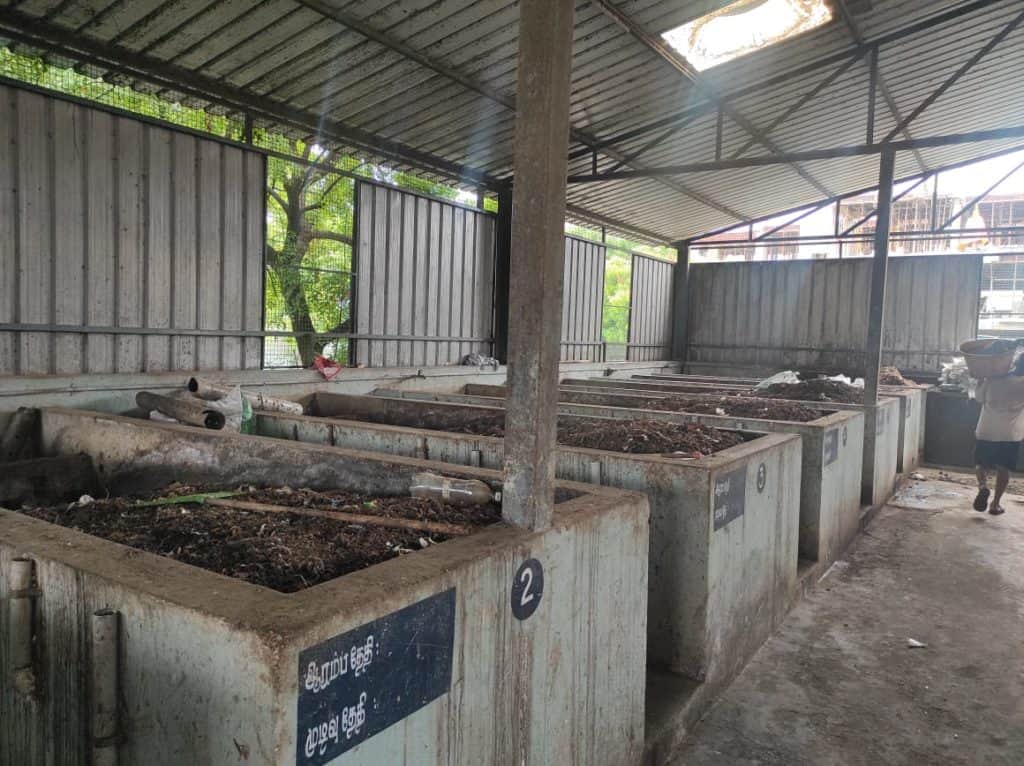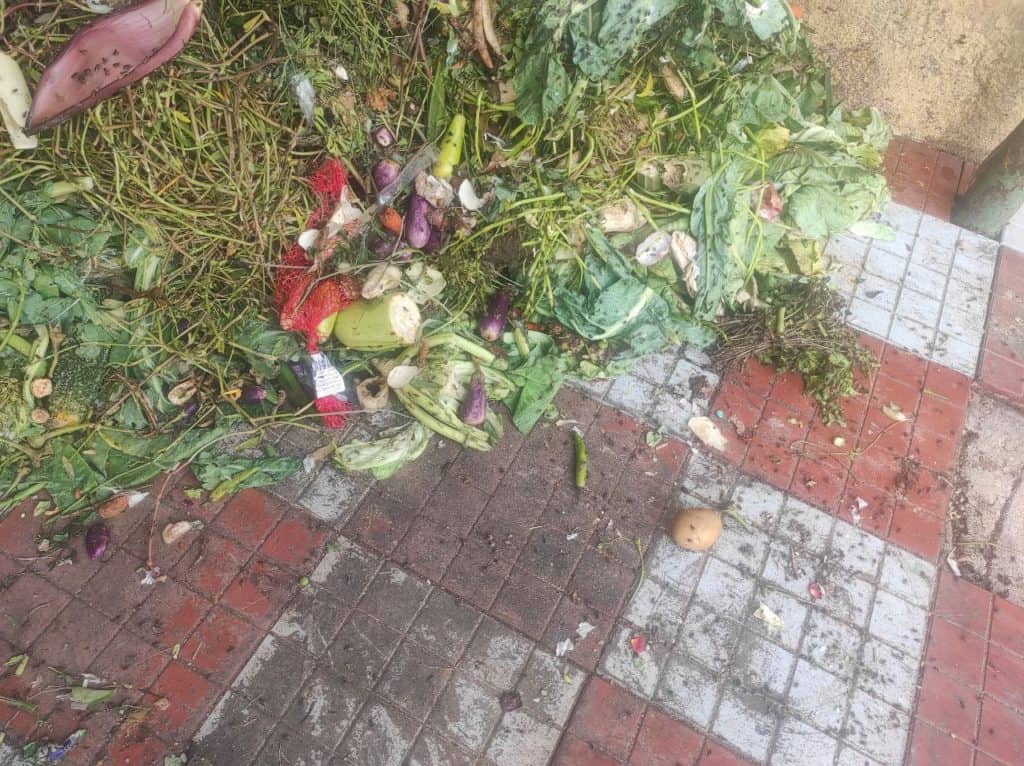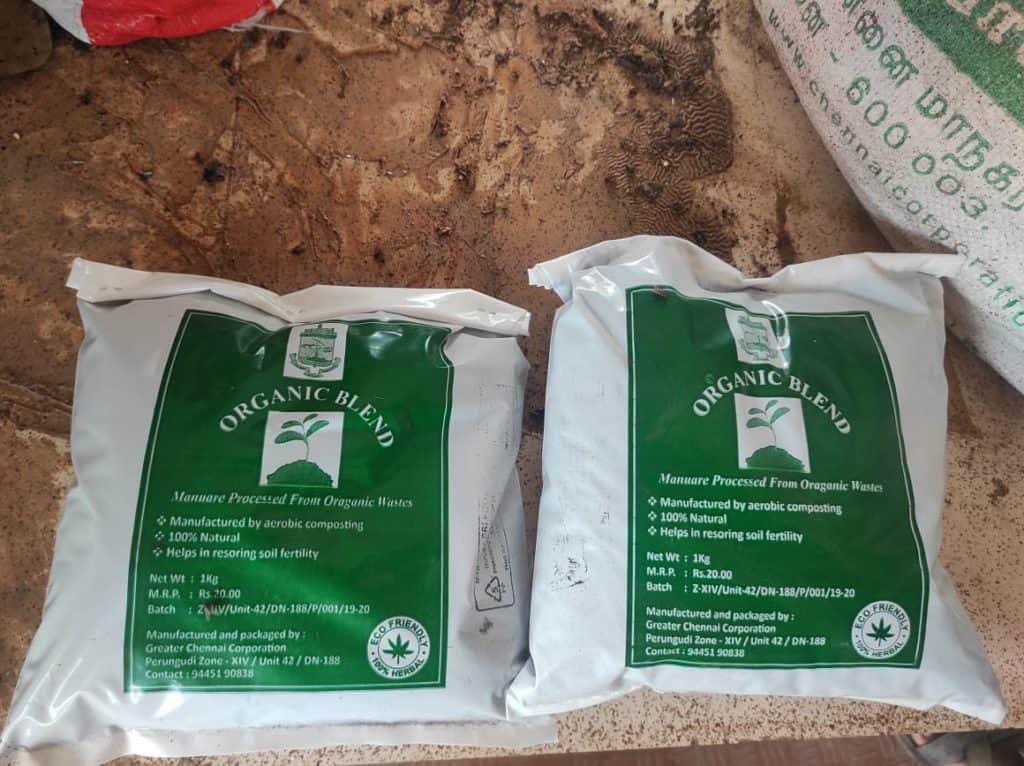Waste management had long been a puzzle that Chennai failed to crack as the city grew over the past few decades. As the city made strides toward decentralised waste management, there was hope that this might prove to be the step that improves the situation.
However, over a year after the new system was put in place, there are questions about the efficacy of its working.
One of the two key components of decentralistion is wet waste composting which takes place through dedicated micro composting centres (MCCs). Citizen Matters zoomed in on how wet waste is treated in the city and visited 10 micro composting centres (MCCs) for a spot check.
Based on the visit and the figures pertaining to wet waste composting in the city, we look into what the roadblocks to effective wet waste management are in Chennai.
Wet waste at micro composting centres
According to an official in the Solid Waste Management department of the Greater Chennai Corporation (GCC), there are 176 MCCs functioning in the city, with 706 workers on their payroll.
Private contractors maintain 110 MCCs and the GCC handles the rest. These centres across the city have the capacity of processing 600 metric tonnes of wet waste per day.

Statistics from the Tamil Nadu Pollution Control Board 2020 state that 5100 MTPD (metric tonnes per day) of waste is generated across the city, among which 2600 MTPD is wet waste. Currently, the MCCs treat an average of 575 MTPD of wet waste, as per GCC data. Only 22.1% of wet waste goes to MCCs, given the TNPCB data mentioned above. The rest of the wet waste presumably ends up in the landfills in Perungudi and Kodungaiyur.
The data reflects the issues that have been found in the current waste management system, such as poor source segregation and improper management of the MCCs that have prevented effective utilization of the facilities.
Read more: Waste and the city: What I learnt at the Venkatamangalam composting yard
Roadblocks in the working of the micro composting centres
The MCC in Raja Srinivasa Nagar Burial Ground has been closed for around three years, says V Jayakumar, Thiruvanmiyur Kuppam leader. “Before setting up the MCC, they did not ask for public opinion. Within seven days of operation, it started letting out a sick odour, much to the annoyance of the public,” recounts Jayakumar, adding that after public protests, the MCC shut operations.
Apart from the unpleasant smell, not all MCCs run at full capacity. “I personally visited some MCCs in the south zone of the city. Even though they are well-maintained, they are not running to their full capacity,” says Janani Venkatesh, a resident of Kasturba Nagar.
Apart from this, MCCs have also experienced issues with labour shortages. No workers have been coming to an MCC in West Saidapet due to labour issues, according to the administrative staff.
These assertions were also true of the MCCs visited by Citizen Matters earlier this month.
“The key to optimally utilise the MCCs is to increase capacity and hire more workers,” says S Rukmani, founder of At last, We Cannot Eat Money (AWCEM) Foundation, a non-profit working on waste management awareness in the city.
Another key factor impacting wet waste management is the level and quality of segregation at source. “Other waste is mixed with organic waste in many of the centres,” says Janani.
“When there are plastic pieces in the wet waste brought to the MCCs, the quality of composting comes down,” says Rukmani. “People must appreciate that the conservancy workers are also working for their families and their health is also important. Therefore, they must segregate the waste at the source,” she adds, insisting that it is not the job of the workers.
Need for an SOP
A key issue in the running of various MCCs in the city has been the absence of a uniform method of composting. In addition to that, there was no official Standard Operating Procedure (SOP) issued by the civic body for running these facilities. Citizen Matters did not obtain a response from officials of the GCC when asked about the absence of SOPs and guidelines for MCCs.
“Bad smell is generated when there is more wet waste, less microorganism solution and less ventilation,” explains B Samuel Jacob, Assistant Professor of Biotechnology at SRM Institute of Science and Technology.
To use the MCCs to their maximum potential, vermicomposting units can also be added to the facility, he says. The manure produced by the latter method has higher quality than that from the micro composting method. “Therefore, the vermi-composted manure can be sold at higher rates to earn more capital and expand the capacity of composting centres in the city,” suggests Professor Samuel.
Read more: Green worship: These Chennai temples show the way by composting floral waste
He also lays out the procedure that should be followed for micro composting to ensure good quality of manure and to reduce the odour:
- The wet waste consists of vegetable and fruit waste. Cooked waste can be used as long as it is not watery.
- It must be shredded properly with no chunks. Larger chunks will impede efficient composting.
- Then the shredded waste must be piled in cement tanks. There should be a layer of sand at the bottom, followed by alternate layers of waste and cow dung. Along with cow dung, boosters can be added like a mixture of curd and jaggery to speed up the process.
- While doing composting, wet waste must be mixed with dry waste (cocopeat, dry leaves, tea powder, etc.) One part of dry waste must be mixed with three parts of wet waste. Dry waste is the source of carbon and maintains the moisture level while composting. More moisture can lead to a bad smell and a breeding ground for insects.
- After piling, every two-three days water must be sprinkled. This is because composting generates heat. If water is not sprinkled, the heat will affect the microorganisms responsible for composting.
- The layers of waste and cow dung in the tank must be turned regularly, along with spraying water. This ensures uniform composting, as the bottom layers undergo more rapid composting than the top ones. The turning also ensures the compost is well-ventilated, thus not giving rise to a foul smell or infestation of insects.
- This process must be done over a period of 30-40 days where one can see the waste turning into a brown powder, which is manure.
- After that, it must be sieved and the fine manure is packed.
- For the subsequent batches of wet waste, instead of cow dung, the residual compost can be added since it also contains the same microorganisms for composting.
“The people working in the micro composting centres are not highly-qualified. They can understand the procedure clearly if they are taught practically, step-by-step. There should be constant supervision,” recommends Rukmani. If a foul smell is coming from the facility, the workers must know how to fix it, she adds.
“For people to not be disgusted at the facility, it must be maintained very neatly so that everyone is curious to come and learn about wet waste management, ” says Rukmani. A beautiful garden at an MCC will earn brownie points among residents, she concludes.
What happens to the compost produced?
The manure produced from MCCs is sold at Rs 20/kg at ward offices, at the centres, parks, beaches, bus stops, railway stations, and Tamil Nadu Cooperative Marketing Federation Ltd.
While GCC has sold up to 712 MT of manure, earning Rs 64 lakh since May this year, the potential for achieving the twin goals of reducing landfilled waste and generating revenue seems a tall order the way things stand at present.
Better source segregation and standardisation of operations is an important step that must be considered by the civic body to properly operationalise the decentralised system and achieve the goal of a zero-waste Chennai.
Also read:
- How can we bring waste management back on track in Chennai post COVID?
- What do we do with Chennai’s legacy waste?


The answer to this problem is Bokashi composting which eliminates the side effect of foul smell. It’s being used all over the World with great success. This is the solution!!! It’s aerobic composting!!! Don’t cry for solutions when there is one available which is proven